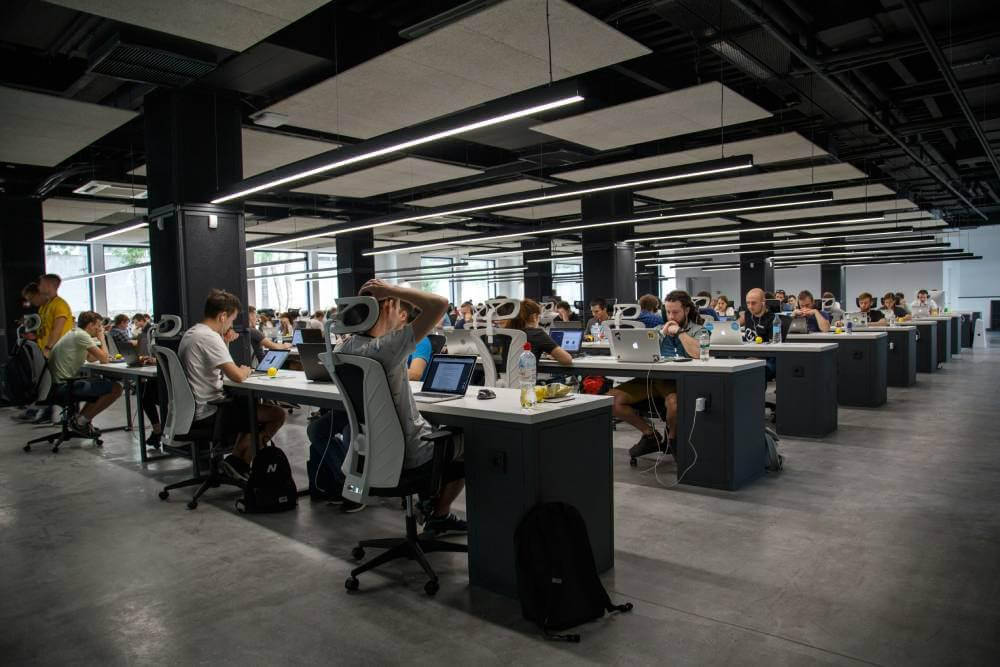The layoff wave is still rolling in 2024. After the big cuts in 2022 and 2023, 2024 has already seen over 130,000 job losses across 457 companies, according to Layoffs. FYI. Big players like Tesla, Amazon, Google, TikTok, Snap, and Microsoft have all been laid off in the first few months of 2024. These company plans usually involve big corporate restructuring, layoffs, and cost-cutting. The global workforce has been hit hard, with many companies reducing headcount in response to financial challenges and changing market demands. Smaller startups have had their share of reductions. Some have even shut down completely.
Following this layoff, you can see how innovation is being impacted across big and small companies. It also shows the growing role of AI and automation, which is replacing jobs that were once considered safe. Beyond the numbers, layoffs also show the human cost and the future of innovation in the tech industry.
Kaspersky Shuts Down UK Office

Follows US Office Shutdown
Kaspersky is closing its UK office and laying off dozens of employees, another big step in its global restructuring. This comes just three months after it started winding down its US operations, where it also cut a big chunk of its workforce. The UK office closure is the second big Western market Kaspersky is pulling out of in quick succession.
Long-time Cybersecurity Presence Hit
Kaspersky’s office closures are significant because of its long history and influence in the global cybersecurity space. As a major player in antivirus and security software for years, the company has been a big part of the ecosystem. However, these layoffs show that the company needs to adapt to the changing market and regulatory landscape.
Geopolitical Pressures
Kaspersky’s decision to close its UK and US offices may also be due to geopolitical pressures and security concerns raised by governments in both countries. Because of its Russian roots, the company has been under increasing scrutiny, and both US and UK governments have raised national security concerns. This has led to restrictions on using Kaspersky products in government agencies and making it harder to do business in these regions.
Human and Strategic Impact
For the employees affected, this is another hit in the ongoing tech layoff wave that has continued into 2024. As Kaspersky is pulling out of key markets, it raises questions about its future strategy and competitiveness in the cybersecurity space. The closures and layoffs may also mean Kaspersky will focus more on markets where it has fewer political and regulatory hurdles, but the long-term impact on its global presence remains to be seen.
NFX Shifts, Lays Off 4
NFX, a venture capital firm that backs early-stage startups, has laid off four employees as it refocuses internally. According to general partner Pete Flint, this is a strategic move to “rebalance” the firm. The layoffs hit NFX’s software and product teams, and the firm is redirecting its efforts and investments toward its core focus—venture capital and investing.
Refocusing on VC Ops
The reallocation of resources shows that NFX is fine-tuning its approach to the rapidly changing venture capital landscape. As the firm grows its portfolio, it has prioritized its investing team over the software and product divisions. Flint said this is to position NFX to pounce on new investment opportunities and support its portfolio companies with more focused venture strategies.
In the last few years, NFX has built a software and product team to create tools and platforms to help startups network, grow, and scale. However, as the market has evolved, the firm has decided to streamline its operations and pull back from those efforts to focus more on its investing capabilities. This is a broader industry trend where firms are doubling down on their core strengths in a volatile market.
Venture Capital Landscape
NFX’s layoffs are part of a broader trend in venture capital firms where many are reevaluating how they deploy internal resources in response to market conditions. In a sector that has seen more volatility, including tech layoffs and economic uncertainty, venture capital firms are being more selective on how and where they allocate resources.
This may be a small reduction in headcount, but it shows that NFX is committed to adapting for the long term. The firm, which has a strong reputation for backing early-stage startups, is making sure it remains agile and competitive in the venture capital space.
Resource Allocation for Growth
For NFX, this is not just about cost cutting but about focusing on creating more value. By prioritizing the investing team, NFX can devote more attention to finding and supporting new startups and managing its existing portfolio. In a time when venture capital firms are under pressure to show returns in a tighter funding environment, NFX is taking a proactive approach.
Eaze Laid off 500
Big Layoffs Amid Market Woes
Eaze, a well-known cannabis delivery service, is laying off 500 employees as it winds down. In a note to the company’s staff, CEO Cory Azzalino said the “ongoing challenges of the California cannabis market” were the reason for the closure. This is a big downsizing for Eaze, which was once a major player in the cannabis delivery space.
California Cannabis Market Challenges
The California cannabis industry is facing many challenges, high taxes, complex regulations, and increasing competition, all of which have created a tough operating environment. This has impacted businesses across the state, and Eaze is the latest to fall into an industry where profitability has become elusive. Despite the potential of the California market, regulatory hurdles and financial pressures have made it hard for companies to scale long-term.
Eaze’s Diversification and Pivots
Eaze tried to adapt to the changing market by diversifying. The company went into retail by opening dispensaries and new product lines to capture more of the cannabis market. However, these efforts were not enough to overcome the financial and operational challenges many cannabis businesses in California face. Despite the pivots, Eaze struggled to be profitable in a volatile market.
Industry-Wide Issue
Eaze’s laying off so many employees and winding down is a stark reminder of the industry-wide issue. Many cannabis companies, especially in California, are facing the same regulatory and financial pressures. While the industry has growth potential, it’s a tough landscape to navigate. Eaze’s closure is a big blow to its employees and a sign of the ongoing chaos in the cannabis space.
PubMatic Laid off 1%

Small Workforce Reduction as Part of a Strategic Pivot
PubMatic, an ad-tech company, laid off 1% of its workforce or just over a dozen people. This is part of the company’s reported pivot to connected TV (CTV) advertising, a fast-growing part of the digital ad market.
Focusing on the CTV Advertising Market
The layoffs reflect the company’s shift as it adapts to the changing ad landscape. With the rise of streaming and connected TV usage, the CTV ad market is a big growth area for many ad-tech companies. PubMatic is aligning its resources to the trend by focusing more on CTV advertising and reallocating staff accordingly.
Preparing for Growth in a Crowded Market
While the number is small, this is part of the broader strategy to prepare PubMatic for growth in the competitive digital ad market. The shift to CTV allows the company to reach a growing audience of cord-cutters and streaming service users, creating new opportunities for both advertisers and publishers. As PubMatic evolves, its focus on CTV will be a big part of its growth strategy.
Tome Laid off Almost a third of Its Workforce
Second Layoff of 2024
Tome, an AI startup, laid off almost a third of its employees as part of a broader “reset.” This is the company’s second layoff of 2024, and it’s clear the company is having trouble navigating its business.
Reorganizing and Stabilizing
The layoffs are part of an internal restructuring as Tome tries to stabilize and reprioritize. As AI startups face increasing competition and pressure to innovate fast, Tome’s layoff suggests the company is rethinking its growth and operational efficiency strategy.
Forward
While big, these layoffs might be to free up the company’s resources and a clearer path forward. By “resetting,” Tome is positioning itself for long-term viability in a crowded AI landscape. As the company moves forward, we’ll see how it navigates the broader AI market and delivers on its tech.
Alma Laid off 9%
Company-wide Layoffs Across all Departments
Alma, a growing company, laid off 9% of its workforce across most departments. The layoffs are part of the company’s strategy for “long-term sustainability” in changing market conditions.
Stability for the Future
The company says the layoffs are to ensure future stability so Alma can restructure and realign its business for a more sustainable model. As many companies face economic challenges and industry changes, this is a preemptive move to protect the business long-term.
A Clearer Path Forward
While the layoffs will impact many teams, Alma’s leadership wants to create a more efficient and nimble company. This streamlining will allow Alma to grow more financially sustainable and remain competitive and adaptable in the current market.
Flexport Laid off 2%
Follow up to January’s Big Layoff
Flexport is laying off about 2% of its workforce. This is the company’s second layoff of 2024. January’s layoff was much bigger, 20% of the workforce.
Streamlining
The layoffs are part of Flexport’s ongoing efforts to streamline and adjust to changing market conditions. While this round is smaller than the previous one, it shows the company is re-structuring to be more efficient and financially healthy after the big layoff earlier this year.
Adapting to the Market
As a global logistics and supply chain tech company, Flexport has faced a tough economic environment and changing demand. These layoffs are the company’s way of reallocating resources and operations to the market for a more sustainable path forward.
FreshBooks Laid off 140

Company-wide Layoffs Across all Teams
FreshBooks laid off 140 employees across departments as part of its path to profitability. CEO Mara Reiff announced the move in a blog post, saying the company needs to streamline to achieve long-term financial stability.
Profitability in a Competitive Market
The layoffs come as FreshBooks, a cloud-based accounting software company, is focused on becoming profitable in a crowded market. Reiff said reducing headcount was hard but necessary to ensure the company’s financial health and to serve its customers well.
Growth for the Long-term
With the reduced headcount, FreshBooks will reallocate resources and refocus on its core business. By cutting costs and reorganizing its teams, the company will be able to adapt to the market and grow sustainably in the future. The layoffs are part of FreshBooks’ bigger goal to be a more efficient and financially healthy business in the long term.




















